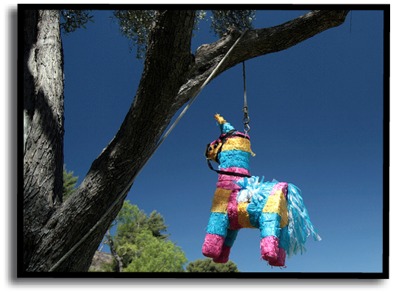Posted by Nicky Drayden on Mar 27, 2010 in
Reviews Published by: Fantasy Magazine, March 22, 2010
 Photo by Peasap Creative Commons
Photo by Peasap Creative Commons
The Story:
Molimus, a great giant so broad it takes four men’s shirts stitched together to clothe him, lives under a bridge collecting flotsam for trade. From his vantage, he witnesses the assassinations of marvelous, colorful animals, beaten to death by the sticks and swords of children. Molimus can’t believe how cruel these children are, taking pleasure in the kill, then plundering the prizes that tumble out of the animals’ carcasses — prizes like caramels and toy rings.
When Molimus finds a vibrant little horse that had somehow lived through a savage beating, he decides to nurture it back to health. Though it’s full of holes, the horse remains in good cheer, but beyond bandaging up the wounds, Molimus knows nothing of how to give life back to the horse. So he sets out to see the White Ma’at, an old, old woman who knows all and sees most.
The Craft: Character Arcs
SPOILERS
In the first part of the story, Molimus’s character comes off as gentle and compassionate, yet spiteful. Despite his size and strength, his occupation is one of quiet and patience, sifting through the flotsam passing under his bridge for objects of value to barter. Molimus has a strong sense of morality, and feels strongly about the atrocities the children bring upon such magnificent creatures. He opens his heart up to one such creature, a horse struggling for survival, and takes it upon himself to nurse his Gleeful Horse back to health.
Molimus’s compassion and spite are shown again later in the story when he visits the White Ma’at. Even though she tells Molimus that the children are not to blame, for they do not see the animals as living as they do, Molimus hangs on to his hatred of the children for their vile acts. However, he’s sensitive enough to realize that something is troubling the White Ma’at, and he knows that she must be tired of the prison she finds herself in, trapped in her home by Prince November. Molimus feels for her, and he wants to save the Gleeful Horse, so he makes a deal with the White Ma’at that will help them both.
Molimus is tasked with filling the Gleeful Horse with treasure to restore its life, but the White Ma’at tells him that it’s not the trinkets that spill from the treasure animals’ wounds that he must find. He needs to collect starlike pieces, which are only found in living things, most abundantly in children. Molimus, who’s been full of compassion and virtue up until now, starts to feel something else — shame. The shame, now tangible in Molimus’s throat, gets coughed up, and once he’s rid of it, he’s able to go on his journey. He steals life from children and splits it between the White Ma’at so she can build power to escape Prince November, and his Gleeful Horse which devours the life quickly, requiring Molimus to harvest more and more.
While Molimus’s intentions are good, he goes from a gentle giant to a monster, and in the grand pursuit of saving one life, he’s forced to take the lives of countless others. Maybe Molimus beleived deep down that the children were innocent of their cruelty. Maybe that’s why he had felt qualms about the deal he made with the White Ma’at. The possiblities are fun to think about, and I like that the truth is not explicity spelled out. I enjoyed sharing Molimus’s journey with him, though I’m grateful I could do so without sharing his fate.
Tags: character arcs, fantasy, Fantasy Mag, horses, piñata
Posted by Nicky Drayden on Mar 13, 2010 in
Reviews Published by: Fantasy Magazine, March 1, 2010
The Story:
In Bearing Fruit, a sixteen-year-old girl bathing in a river near her home finds herself smitten with a mango bobbing in the current. By the time it’s had its way with her, the poor girl finds herself suddenly with child. Of course no one believes her story, and she can barely believe it herself. She doesn’t know much about how babies are made, but she’s pretty sure that fruit isn’t involved. Even though her closest cousins vouch for her chastity, the girl is still subtly shunned by her family and neighbors, so she sets forth on a journey upstream to find the father of her unborn child.
The Craft: Character Arcs
SPOILERS
If there’s one thing that will change a young woman, it’s getting knocked up by a frisky piece of fruit. Not only is her body going through a rapid change, but so are her relationships, her perceived value to her village, and her own self-esteem. At the beginning of the story, she’s innocent, virtuous, and carefree. Once the prettiest girl in the village, the pregnant girl finds that her prospects have dwindled, and the boy cousins who once safeguarded her virtue are now given more useful tasks, such as building a shelter for the family’s livestock.
It’s at this point that our young heroine departs from her initial character setup, no longer so innocent, virtuous, or carefree…at least in the eyes of her family. They’re relieved to be rid of her when she announces that she intends to set out on a perilous journey into the wild to find the father of her unborn child. With the company of her closest girl cousins, and armed only with sticks and their sharp tongues, they travel upstream not knowing what to expect. She’s quick to accuse the first soul they happen upon: a young boy attending a mango tree for an old widow. It turns out that he’s not the culprit, and though he does offer to escort one of the weary girl cousins home under suspicious pretenses, our heroine has learned she is no longer fit to judge other people’s choices.
Her physical changes quickly escalate after a brief encounter with a handsome thief using the trunk of a mango tree to stash his stolen goods. As our heroine makes her way further up the now tumultuous river, her pregnant belly weighs heavily upon her and she’s cursed with morning sickness as well. She comes upon an old man tending a mango tree, though our heroine is too disgusted with mankind to afford him any sort of respect. She discovers that indeed this man knows how her pregnancy came to be — that the mango was set forth on a journey to find his shy son a wife. Swept up in a lavish lifestyle, our again fair maiden has the opportunity to reclaim her respectability, though at the cost of her self-respect. The son never receives the tongue lashing she’d been saving for him, and though the life he offers her is not a bad one by any means, her thoughts circle back to that handsome thief and the life she might have had with him.
Bearing Fruit is a great, quirky tale with a bittersweet character arc. Going from innocence, to driven by fierce resentment, to settling for a life that isn”t her choice but is good enough. If she hadn’t found her drive, she would have remained at home, shunned. If she hadn’t decided to barter her self-respect for stability and comfort, she would have remained poor. But through her changes, she reaches an ending she can live with, even though it’s not her happily-ever-after that fair maidens are often promised.
Tags: character arcs, fantasy, Fantasy Mag, folk tale, mangos, must read, pregnancy, second person
Posted by Nicky Drayden on Feb 13, 2010 in
Reviews Published by Fantasy Magazine, February 1, 2010
The Story:
The Blue Heart clan prides itself on its hospitality, offering a complete stranger room in their already cramped underground quarters on the eve of the stinging rains. It’d be barbaric to leave a man above ground to be burned alive, so there’s no doubt one of the clan’s nests will make room for him. It’s only a matter of which one.
Roday watches as the families scramble with their last-minute preparations to go underground, helping out when she can. But she’s an old woman with no family of her own, not much use to anyone. Sure the other women smile at her, make polite conversation, but no one will offer her accommodations during the stinging rain. Roday holds onto hope despite herself, hinging her fate on the strength of thinning family lines. But when the stranger comes to her, his accent thick and his words bent sideways to her ear, Roday learns that her life might still be useful to someone after all.
The Craft: Beginnings
SPOILERS
The opening sentence is a mouthful at nearly sixty words, completely glossing over the introduction of the stranger for some interesting details and world building. We quickly learn that family gossip is important to these people, and that they’re living in a polyandrous society, possibly matriarchal. The end of the paragraph sets an urgent tone, women working to beat the oncoming stinging rains that will force the clan below ground. This paragraph works overtime, giving us setting, some characterization, some interesting details, and a looming problem.
In the next few paragraphs, the problem intensifies. We find out that families are arguing about family lines and obligations to take relatives in. The importance of family ties is reinforced here. Resources are slim and space is tight, but there’s no doubt that some family will offer to provide shelter for the stranger, because that is the Blue Heart clan’s way. And yet the reader feels uneasy about Roday’s situation. Her own position has not been secured, and although she has a hard time admitting it to herself, it’s obvious that everyone is avoiding her. And so we come to Roday’s real problem and the premise of the story — what worth is an old woman to anyone?
This story hits at a fear that all readers can relate to. It’s easy to slip into Roday’s point of view, feeling useless, hopeless. Then the stranger enters her life, and despite his odd manners and twisted speech, he reaches out to her in his own way. He knows the importance of life, and is trying to atone for the three lives that he’d taken. He’s hurting, and Roday doesn’t understand why he won’t take the Blue Heart clan’s offer for safety, to live. But for the stranger, living is not enough.
This very effective beginning makes the ending really resonate. The themes of obligation and kinship set up in the first few paragraphs of the story run strongly and effectively through the entire piece. The forces that make Roday an outcast in the beginning are the same ones that deliver her salvation. The solution is a simple one in plot, but huge in characterization. The stranger saves her with a tie of kinship, a priceless gift to Roday, and her very life brings the stranger closer to fixing and unfixable wound in his own heart.
Tags: beginnings, fantasy, Fantasy Mag
 Photo by Peasap Creative Commons
Photo by Peasap Creative Commons